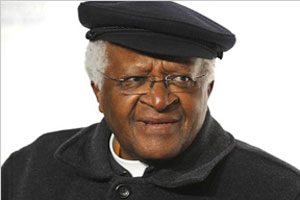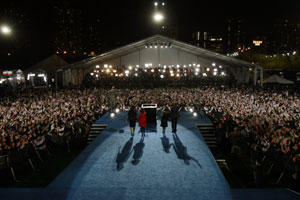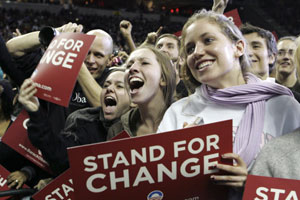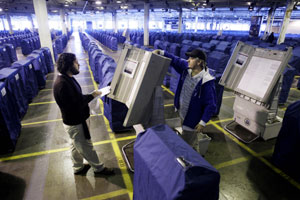Focus on America
Desmond Tutu Awarded 2008 U.S. Fulbright Prize

If peace and understanding could be human, then South African Archbishop Emeritus Desmond Tutu would be one of the best examples of these concepts because few have worked harder for them, often in the face of insurmountable odds.
Tutu was awarded the 2008 J. William Fulbright Prize for International Understanding at the State Department November 21. Tutu accepted the honor on behalf of “many who have often been faceless, anonymous.”
The Fulbright Prize recognizes Tutu’s “tireless work for peace in South Africa and elsewhere, his courage in speaking out against injustice, his efforts to achieve a democratic and just society without racial division, and his initiatives to alleviate suffering caused by HIV/AIDS,” the Fulbright Association said in a prepared statement.
Fulbright President Suzanne Siskel said it is “a great honor to confer the 2008 Fulbright Prize on Archbishop Emeritus Desmond Tutu, whose life work exemplifies the conviction that we must, as the Fulbright Program’s founder insisted, recognize human dignity as the essential common bond for a peaceful world.”
The prize carries a $50,000 cash award provided by the Coca-Cola Foundation. The award was presented to Tutu by Coca-Cola Chairman Neville Isdell.
“From war-torn countries to poverty-stricken communities, Desmond Tutu walks into darkness and always finds the light,” Isdell said. “He sees the best in people as he confronts the worst in people. You can’t look at his life’s work — at his campaigns for human rights, his efforts against [tuberculosis] and HIV — and not come away hopeful about tomorrow.”
The J. William Fulbright Prize for International Understanding was created by the Fulbright Association in 1993 to recognize individuals who have made extraordinary contributions toward bringing peoples, cultures and nations to greater understanding of others. Past recipients include former President Bill Clinton, former Secretary of State Colin Powell, former Czech Republic President Vaclav Havel, former President Jimmy Carter, and former South African President Nelson Mandela.
Fulbright served as a U.S. senator from Arkansas from 1945 to 1975 and was the longest serving chairman of the Senate Foreign Relations Committee. He helped create an international exchange program, Fulbright Fellowships, that helps enhance international understanding. The program is administered by the State Department’s Bureau of Educational and Cultural Affairs.
Tutu won the Nobel Peace Prize in 1984, Mandela in 1993, and Carter in 2002. On November 20, Tutu joined with 30 other Nobel Peace Prize recipients and the nonprofit group Save the Children in calling for help for millions of children trapped in war zones across the globe. The letter was released on the 19th anniversary of the adoption of the U.N. Convention on the Rights of the Child.
“If more than 70 million children do not even have the chance to go to school, and more than half of these children live in countries affected by armed conflict — what are these children learning?” the letter asks.
Recently on Focus on America
World Celebrates Barack Obama’s Historic Win
 In homes and on streets across the United States, Americans celebrated the election of the first African-American president as a significant moment in U.S. history.
In homes and on streets across the United States, Americans celebrated the election of the first African-American president as a significant moment in U.S. history.
“Youthquake” Expected in 2008 U.S. Election
 It is a historic presidential election, no matter what the outcome: Either an African American or a woman will be elected to one of the United States’ top two elected positions for the first time. But 18- to 29-year-olds also will be making history, as they turn out to vote in numbers projected to set new records.
It is a historic presidential election, no matter what the outcome: Either an African American or a woman will be elected to one of the United States’ top two elected positions for the first time. But 18- to 29-year-olds also will be making history, as they turn out to vote in numbers projected to set new records.
Electronic Voting Technology Has Not Won Trust of U.S. Voters
 Some U.S. jurisdictions are backing away from using electronic voting systems even as many other democracies are adopting them, panelists at a discussion sponsored by the National Archives said.
Some U.S. jurisdictions are backing away from using electronic voting systems even as many other democracies are adopting them, panelists at a discussion sponsored by the National Archives said.